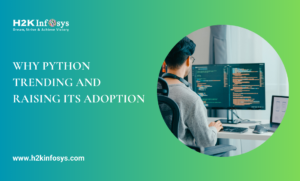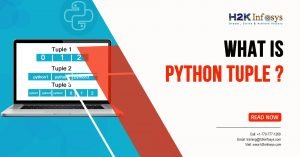Introduction: Why Python Is the Language of the Future
Python has become the backbone of modern software development, data science, artificial intelligence, automation, and web development. Whether you’re a fresh graduate or a working professional, gaining Python skills can open up a world of high-paying job opportunities. This blog will walk you through essential Python Course Details, including the full syllabus of Python, job roles, and salary expectations. With practical insights and career-ready knowledge, you’ll understand why Python is worth your time and investment.
What Makes Python a Popular Choice?
Before diving into the Python Course Details, it’s important to understand why Python continues to dominate the industry:

- Easy to Learn and Read: Python has a simple syntax that mimics natural language.
- Versatile: It’s used in everything from web development and data science to machine learning and DevOps.
- Large Community Support: Thousands of libraries, frameworks, and forums are available.
- High Demand in Job Market: Python consistently ranks among the top programming language‘s in demand.
Python Course Details: What Will You Learn?
Let’s break down the comprehensive Python Course Details to give you a roadmap of your learning journey.
1. Introduction to Python
- Installing Python and the IDE setup
- Python syntax and indentation
- Variables and data types
- Type casting and user input
- Basic operators
2. Control Flow Statements
if,elif, andelseconditionsforandwhileloopsbreak,continue,pass
3. Functions and Modules
- Defining functions
- Built-in vs user-defined functions
- Arguments and return values
- Creating and importing modules
4. Data Structures in Python
- Lists, Tuples, Sets, and Dictionaries
- List comprehension
- Dictionary manipulation
- Nested data structures
5. Object-Oriented Programming
- Classes and Objects
- Constructors and destructors
- Inheritance, Encapsulation, and Polymorphism
- Method overriding
6. Exception Handling
- Try, except, finally blocks
- Raising exceptions
- Custom exceptions
7. File Handling
- Opening, reading, writing, and closing files
- File modes and operations
- CSV and JSON file handling
8. Working with Libraries
- NumPy, Pandas, Matplotlib basics
- Creating data visualizations
- Exploratory Data Analysis
9. Advanced Python Topics
- Lambda functions and
map(),filter(),reduce() - Decorators and generators
- Regular expressions
- Python with SQL
These Python Course Details ensure you’re not just learning syntax but building the foundation for real-world problem solving.
Career in Python Programming: What Can You Do?
Once you complete the course, there are numerous roles you can step into. Let’s explore some of the top jobs you can get with a Python certification:
1. Python Developer
Build applications, automate tasks, and develop APIs using frameworks like Flask or Django.
2. Data Analyst
Use libraries like Pandas and NumPy to clean, analyze, and visualize data for business insights.
3. Machine Learning Engineer
Work on predictive models using libraries such as Scikit-learn and TensorFlow.
4. Web Developer
Create responsive and dynamic websites using Python with HTML, CSS, and JavaScript integration.
5. Automation Tester
Use Python for writing automated test cases and frameworks like Selenium.
Each of these roles stems from mastering the Python Course Details and applying them in industry projects.
Salary Insights: What Can You Expect?
Python skills are among the most highly paid in the tech industry. Here’s an overview based on current market trends:
| Job Role | Experience Level | Average Salary (INR) |
|---|---|---|
| Python Developer | 0–2 years | ₹4.5 – ₹6 LPA |
| Data Analyst | 1–3 years | ₹5 – ₹7 LPA |
| Machine Learning Engineer | 2–5 years | ₹7 – ₹12 LPA |
| Web Developer (Python) | 1–3 years | ₹4 – ₹6.5 LPA |
| Automation Engineer | 1–4 years | ₹6 – ₹9 LPA |
These figures grow substantially with experience, especially if you consistently upgrade your skills beyond the syllabus of Python.
Real-World Projects to Expect
An effective Python training course doesn’t just stick to theory. It should incorporate real-time, hands-on projects that mirror job roles. Here are examples of projects aligned with the Python Course Details:
- Web Scraping Project: Extract data from websites using
BeautifulSoup. - Data Visualization Dashboard: Create charts using
MatplotlibandSeaborn. - Mini CRM System: Build a customer management tool using Flask.
- Stock Price Prediction: Use machine learning
Scikit-learnto forecast stock trends.
These projects help bridge the gap between classroom learning and professional execution, making your career in Python programming more job-ready.
Benefits of Python Online Training
Why should you opt for Python Online Training rather than traditional classroom setups?
- Flexibility: Learn at your own pace with recorded sessions or live classes.
- Access to Updated Curriculum: Stay current with the latest in the Python ecosystem.
- Hands-On Assignments: Reinforce concepts through real-world problem-solving.
- Career Guidance: Resume building, interview prep, and placement assistance.
An ideal course delivers all these while covering the complete Python Course Details.
Who Should Take This Python Course?
Python is suitable for:
- Beginners who want to start coding
- Graduates from any stream entering tech roles
- Testers moving into automation
- Analysts diving into data science
- Professionals upskilling for job changes
No prior experience is required if the course explains each concept in detail, starting from the basics to advanced topics in the syllabus of Python.
Long-Tail Keywords to Consider
If you’re searching online for learning resources, you might find these long-tail keywords useful:
- Python Online Training for Beginners
- Advanced Python Programming with Certification
- Real-World Projects with Python Certification Course
- Python Course for Data Analytics and Machine Learning
- Best Career in Python Programming with Job Support
All these are closely related to the Python Course Details and career scope we’ve covered.
Frequently Asked Questions (FAQs)
Q1: Is a Python certification worth it?
Yes. Certification validates your skills and boosts your credibility when applying for jobs.
Q2: Can I get a job with only Python knowledge?
Absolutely. Roles like Python Developer, Data Analyst, or Automation Tester primarily rely on Python skills.
Q3: How long does it take to complete a Python course?
On average, a structured Python certification course takes 8–12 weeks, depending on your pace and prior experience.
Q4: What tools are included in the Python syllabus?
IDEs like PyCharm or VS Code, libraries like Pandas, NumPy, Matplotlib, and frameworks such as Flask and Django.
Key Takeaways
- The Python Course Details include fundamentals to advanced topics like OOP, data analysis, and automation.
- Python is in demand across various industries, including tech, finance, healthcare, and e-commerce.
- With proper training, real-world projects, and certification, your career in Python programming can lead to top-paying roles.
- The syllabus of Python covers the skills required to work in multiple job profiles.
Conclusion
Python is more than just a programming language, it’s a career enabler. With detailed training, job-oriented projects, and industry relevance, mastering Python is your next big step toward a thriving tech career.
Start your journey with H2K Infosys today. Master the complete Python Course Details and build a successful career in Python programming!


























